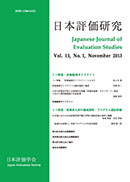Volume 13, Issue 1
Displaying 1-6 of 6 articles from this issue
- |<
- <
- 1
- >
- >|
Special Issue: Guidelines of Ethical Conduct of Evaluations
-
2013Volume 13Issue 1 Pages 1-2
Published: November 20, 2013
Released on J-STAGE: June 01, 2023
Download PDF (603K) -
2013Volume 13Issue 1 Pages 3-17
Published: November 20, 2013
Released on J-STAGE: June 01, 2023
Download PDF (662K) -
2013Volume 13Issue 1 Pages 19-31
Published: November 20, 2013
Released on J-STAGE: June 01, 2023
Download PDF (673K) -
2013Volume 13Issue 1 Pages 33-40
Published: November 20, 2013
Released on J-STAGE: June 01, 2023
Download PDF (621K)
Special Issues:Accreditation of Public Policy School and Program
-
2013Volume 13Issue 1 Pages 41-56
Published: November 20, 2013
Released on J-STAGE: June 01, 2023
Download PDF (1021K) -
2013Volume 13Issue 1 Pages 57-72
Published: November 20, 2013
Released on J-STAGE: June 01, 2023
Download PDF (1084K)
- |<
- <
- 1
- >
- >|
